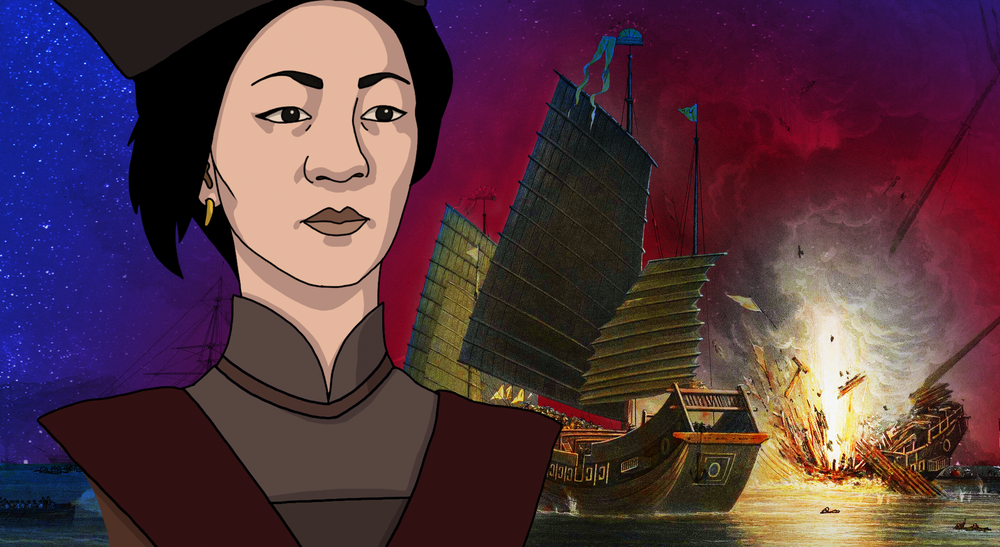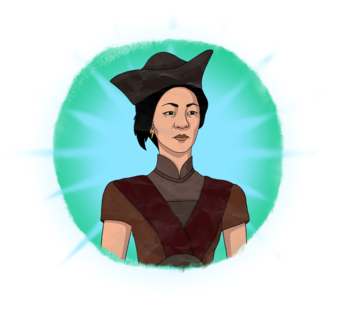
lesson 13 - the pirate queen
Hey there! Welcome back to Puppet History: Online University’s spring semester. I’m Liz, assistant-to-the-assistant (Kari), and general suck-up doing this because after my last newsletter, Kari sent me a thumbs-up emoji + that emoji that looks like a high-five, and now I’m just chasing that RUSH! And now I am PUMPED to talk more about this week’s lesson: Ching Shih. I should point out that most of the sources we have to rely on when it comes to the most powerful pirate in history are fictionalized and sensationalized to an unknown extent, as pointed out by historian & Ching Shih expert, Dian Murray. So this story is a mix of fact and legend.
If you’ve read anything about Ching Shih, you’ve probably read that she went from being a sex worker to a pirate queen. It’s kind of *THE* main hook a lot of articles put out there. What I found interesting is that we don’t actually have evidence from any primary sources clarifying what she was doing on the flower boat. In fact, we know pretty much nothing about her before she enters the life of Cheng I (whose family, by the way, had been in the pirating business since the 1600s!). So she may have been a sex worker, or she may have had some other job. She may have been the dang boss for all we know! Obviously, it would be great to know how Ching Shih’s early life led to her becoming one of the fiercest leaders in pirate history. But not knowing definitely adds to the mystique of pirate life, right? Like, we don’t exactly have a clear understanding of Blackbeard’s biography before he cultivated his fearsome reputation. Would you even want to know what he was up to when he was just a weeny little kid?
By the time Ching Shih met Cheng I, piracy had been a thing in the South China Sea for, oh, a couple millenia already. But there were a few special factors contributing to a spike in piracy there at this time, including a population boom, and more international trade (i.e. pirate candy) coming through Canton, or modern-day Guangzhou; a widening divide in the distribution of wealth, a problem the pirates felt particularly adept at solving; and the Tay Son Rebellion in Vietnam, during which time Chinese pirates were being hired by Vietnamese rulers as privateers. When the Tay Son were defeated in 1802, shortly after Ching Shih entered the picture, there was a bit of a scramble among the pirates who’d emerged as leaders of growing fleets. And Ching Shih was there to make sure she and her husband came out on top.
The Professor mentioned Ching Shih’s strict rules – that sometimes had deadly consequences. And I just want to stress how much these rules, and her enforcement of them, seem to really be at the center of the success of Ching Shih, her husbands, and all of their squadrons. If a pirate tried to go over Ching Shih’s head, she’d literally have their head cut off. If you wanted permission to do pretty much anything, you got it from the leaders of the Red Squadron or, best-case scenario, they chopped off your ears and made you do a bloody fashion show for the rest of the crew. Don’t get me wrong – the pirates under her rule still did all of the plundering and general pirate-y debauchery one would expect. But at the end of the day, everybody knew who was in charge.
Now to answer a few questions that came up. As for how the fleets’ colors were signified, there’s a pretty boring answer that my astute classmates may have already guessed, thanks to the lovely graphics: The ships had red, yellow, green, black, blue or white flags. I know, I wish there were a sexier answer.
Alright, look, I don’t know how to transition into talking about Ching Shih marrying the guy her first husband kidnapped-slash-mentored-slash-adopted. I’m going to stick with the expert here and quote Dian Murray, who has clarified that it was somewhat common to adopt an older kid “in order to establish a kinship basis for further interaction, particularly of a business or discipleship sort”. And now I’m gonna move on!
SALT. Mmmm, salt. Now that’s a sexy subject I wanna talk about. The Professor suggested that he didn’t realize salt was so desirable back then, which is obviously an extremely humorous history joke he simply doesn’t have the time to explain to me. What I do know is that salt has been used for thousands of years as a preservative, and our bodies require salt to work properly. So people in agrarian societies who didn’t get it in their diets from meat or dairy literally needed salt to live. Throughout history, salt has been so influential that it has dictated where roads were built and where people settled. Salt itself has been used as a form of currency; even the word “salary” includes the Latin word for salt – sal. So Ching Shi, knowing that she had a lot of mouths to feed in order to keep everyone happy, was astute enough to target the steady stream of salt coming out of Guangdong province.
As for the skirmish with Admiral Kwŏ lang, Yuentsze-yung-lun mentions eighteen vessels that were at first met with just “a few” led by Chang Pao – before 25 additional pirate ships swooped in from behind to surround the Admiral and his forces. By the way, this is one of the most dramatic moments I came across in the Ching Shih epic; it’s brief and worth a read. Basically, Kwŏ lang was getting on in years so, seeing his plan going to shit, he resolved to die fighting. When at last he came face-to-face with Chang Pao, Kwŏ lang grabbed the pirate’s hair and flashed him a big smile, goading Chang Pao to kill him. But Chang Pao wouldn’t do it, and after Kwŏ lang died by suicide, the pirate Lieutenant gave this, like, award-winning speech about how they’re all “vapours dispersed by the wind...floating and sinking alternately, without any rest” and lamenting that he’d still be blamed for Kwŏ lang’s death. DRAMA.
When it comes to Ching Shih’s retirement, a trend I noticed is that some people get kind of upset(??) when not enough credit is given to the Portuguese navy, whose repeated skirmishes with the Red Squadron in 1809 and 1810 did do some real damage to her whole set-up. So, I guess, great job, Portuguese navy. Cue applause. Point is, Ching Shih knew when to get when the getting was good. As the Professor pointed out, one reason she knew she could probably strike one of the better early-retirement deals in history is because she’d witnessed the Emperor extend a similar deal with Cheng I. There’s yet another reason given for her decision to pack it in, and it’s my favorite: Ching Shih had recently been betrayed by O po tae, the leader of the Black Squadron, who deserted her and got himself a cushy government job. Ching Shih’s response? Knowing she was “ten times stronger” than him, she figured she could land a much better position for herself.
There is one final, lil’ pirate-y attempt in Ching Shih’s story: In 1840, she tried to sue a guy named Wu Yao-nan for stealing money that Chang Pao supposedly gave him thirty years earlier to buy some land with. Ching Shih produced a receipt for this transaction, which was...pretty easily proven to be fraudulent. Hey, you can take the woman out of pirating, but – you get it.




